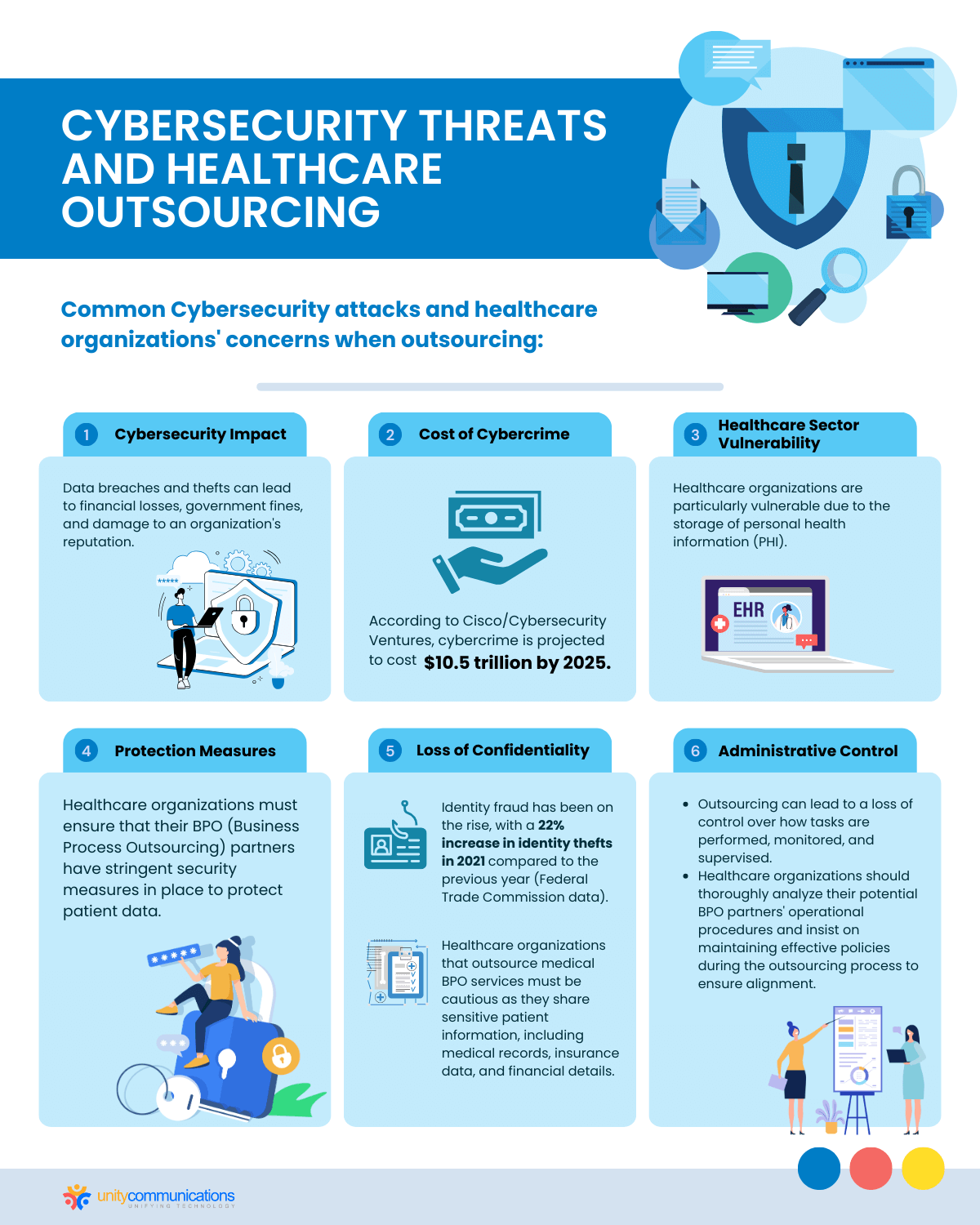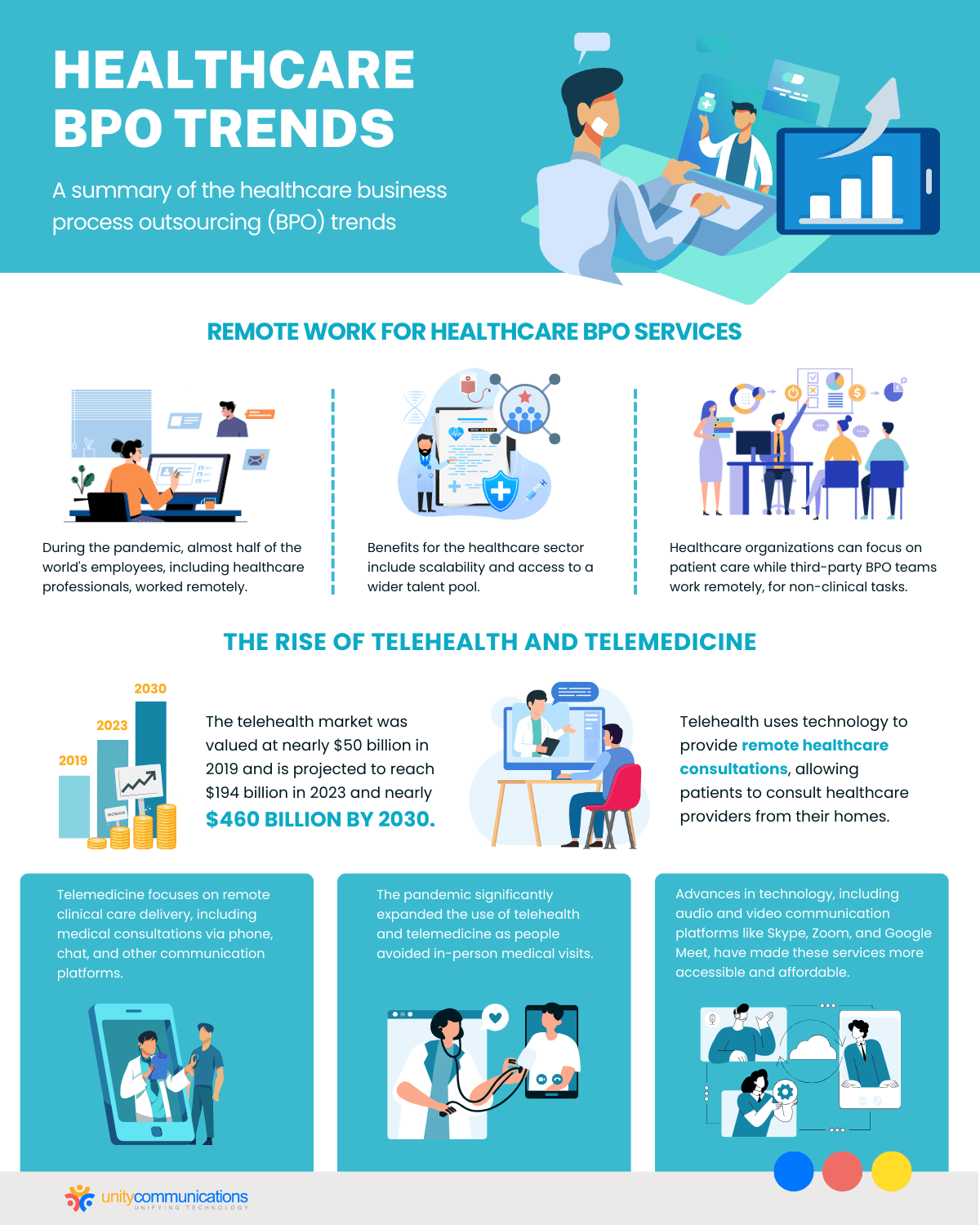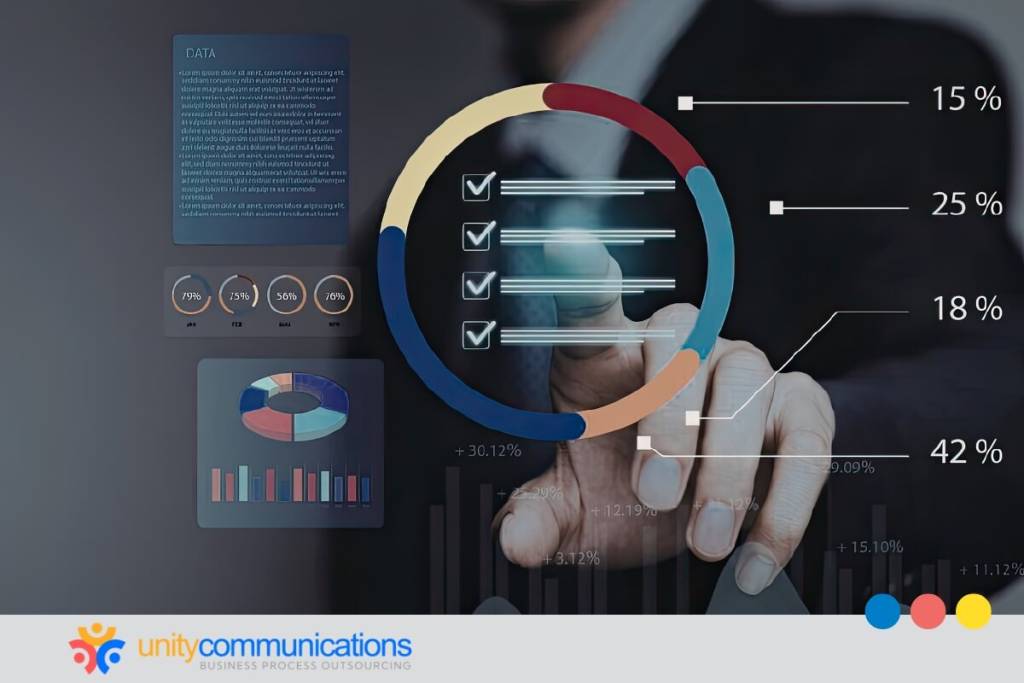IN THIS ARTICLE
Written by Rene Mallari
Contents
Opportunities abound for healthcare business process outsourcing (BPO) in the coming years.
The business practice of medical institutions delegating their non-core activities to third-party service providers will continue to grow. More and more organizations rely on healthcare BPO for help with administrative tasks that take up a lot of their time. This way, they can focus on improving patient care and satisfaction.
But should you follow the trend? Let us find out.
Read on to glimpse the future of healthcare business outsourcing and the opportunities available for healthcare organizations.
Healthcare Business Process Outsourcing Market Outlook

Research and Markets (RM) estimates that the total value of the global healthcare BPO industry will reach around $441 billion by 2026, up from $247 billion in 2021. During the five-year forecast period, the market has a compound annual growth rate (CAGR) of about 12.3%.
The rapid growth of clinical process outsourcing is the main driver for the continued rise of the healthcare BPO sector. Clinical process outsourcing involves delegating administrative tasks in medicine to a third party.
In turn, clinical process outsourcing is expanding due to a hike in the number of drugs going into clinical stages and the growing partnership between healthcare companies and clinical research organizations (CROs).
The study adds that North America (the U.S. and Canada) was the biggest player in the healthcare BPO market in 2021. But the Asia-Pacific region (including countries such as China, Japan, and South Korea) is expected to grow the most over the next few years.
Key Developments in Healthcare Business Process Outsourcing
According to the RM report, technological changes significantly affect the healthcare BPO industry. Third-party providers are spending money to improve and scale their outsourcing services to get a bigger market share.
In May 2020, IQVIA released the healthcare professional and organization (HCP/O) engagement management solution, which was a big step forward in technology.
This solution allows users to plan, contract, supervise, and pay HCP/O anywhere in the world. It works with customers’ current information technology (IT) ecosystems and users’ existing business procedures.
Challenges Facing Healthcare Business Process Outsourcing

Healthcare BPO comes with issues that must be addressed to reduce risks for healthcare organizations and their stakeholders. Below are some of the challenges they must overcome.
Cybersecurity Attacks
Data breaches and thefts can cause financial losses, government fines, and damage to an organization’s reputation. Cyberattacks will become more sophisticated and frequent as more companies use the internet. According to Cisco/Cybersecurity Ventures, cybercrime will cost $10.5 trillion by 2025.
This is especially scary for healthcare organizations, which store and manage countless pieces of personal health information (PHI). The healthcare sector’s biggest problems are threat actors. These hackers will find any means to access healthcare IT systems and steal PHI for malicious purposes.
To protect their patients, healthcare organizations must ensure their BPO partners have strict security measures.
Loss of Confidentiality
According to the Federal Trade Commission, identity fraud has worsened over the past five years. The agency reported that the number of identity thefts in 2021 was 22% higher than in the previous year.
Healthcare organizations that outsource medical BPO services ought to be extra careful because they share important patient information with their BPO partners. This includes medical records, insurance data, bank account numbers, and credit card numbers.
Requesting a non-disclosure agreement from the BPO partner helps prevent data misuse and fraud. In the meantime, BPO companies must ensure their teams have permission to look at patient information.
Less Administrative Control
In general, small and medium-sized organizations outsource at least one business process: 37% outsource accounting and IT services, 34% outsource digital marketing, 24% outsource customer support, and 24% delegate human resources to third-party service providers.
But outsourcing means they lose control over how tasks are done, monitored, and supervised. Their BPO partner might use its own service, support, sales, and operational policies to get the job done.
Before outsourcing, healthcare organizations must ask for and analyze their potential BPO partner’s operational procedures, requirements, and rules to ensure alignment. They should also insist that their BPO partner keep some of their more effective policies in place during the outsourcing process.
Opportunities in Healthcare Business Process Outsourcing
Despite the many challenges facing healthcare organizations, healthcare business process outsourcing still opens several opportunities for them.
Healthcare IT Outsourcing
With a CAGR of about 6.4% over the forecast period, the healthcare IT outsourcing market is expected to grow from about $66 billion in 2021 to about $96 billion by 2028. Healthcare organizations will outsource IT-related aspects of their medical operations to reduce operating costs and provide better care and service.
BPO firms also provide healthcare organizations with experts to manage their IT needs. As such, healthcare organizations can focus on ensuring patient satisfaction and experience.
ICD-10-CM Code Updates
There are 1,176 new billable healthcare codes added to the International Classification of Diseases-10 Clinical Modification (ICD-10-CM) for 2023. ICD-10-CM updates for pregnancy, dementia, care for mothers, and social determinants of health (SDoH) reached their peak in 2022.
The big rise in medical coding updates is due to COVID-19 and the “new normal” way of life. With the new updates, healthcare organizations can offer more services, resulting in greater volumes of transactions. Third-party vendors can ease the load.
Medical Accounts Receivable
As the global healthcare market continues to grow, so does the amount of money that patients and insurance companies owe to medical providers. Maintaining a balanced cash flow and financial standing can be made easier with the help of third-party service providers.
In a survey by the Medical Group Management Association (MGMA), 49% of medical practitioners said that the number of days they spent on accounts receivable went up in 2021. This time can be reduced by working with third-party service providers that specialize in collecting patient balances and processing insurance claims.
A service provider tracks and pursues partially paid bills until they are paid in full. They collect payments on behalf of healthcare companies. A BPO provider manages accounts receivable collection using proven ethical and legal methods.
Emerging Technologies in Healthcare Business Process Outsourcing
Consider the emerging medical technologies making headway. If they become more widespread in the next few years, they can significantly impact healthcare BPO services.
- Artificial intelligence (AI). AI’s global healthcare market value was $11 billion in 2021. In 2030, it will reach nearly $188 billion. AI has been making waves in healthcare for years. And in a decade, its use is expected to grow further. It will be incorporated into various operational and clinical processes such as medical devices and data sensors.
- Data-enabled drug delivery devices. Kal Patel, president of digital health solutions provider BrightInsight, said medical gadgets would be common in healthcare operations. These include tools such as inhalers, auto-injectors, and smart insulin pens that can collect and monitor data. AI then processes datasets for insight into patient care and treatment.
- Machine learning (ML) and blockchain. These technologies help provide personalized service regarding medicine and treatment to patients. They quickly and accurately process clinical and administrative data. Thus, Global Market Insights estimates blockchain in healthcare technology can grow at a 52.1% CAGR from 2021 to 2027.
- Internet of things (IoT). Global IoT spending will total $15 trillion from 2019 to 2025. Instead of contacting clinicians and customer service agents, patients use IoT to help address medical questions and concerns. As technology evolves, we can expect more people to use IoT for their healthcare inquiries.
- Robotic process automation (RPA). The RPA worldwide market was $2 billion in 2021 and might rise at a 38.2% CAGR from 2022 to 2030. RPA is used in customer service, human resources, and help desk functions. Medical professionals can focus on urgent care by having a software robot answer basic patient questions instead.
- ML-powered cybersecurity. Cybersecurity Ventures expects global cybersecurity spending to reach $1.8 trillion between 2021 and 2025. Cybercrime is a risk for the healthcare sector as online services continue to grow. ML-driven data security will help protect IT systems and PHI better.
Healthcare Business Process Outsourcing Trends

Knowing the latest trends helps you decide whether healthcare BPO can benefit your organization. Below are two important trends that influence the direction of healthcare business outsourcing.
Remote Work for Healthcare BPO Services
Full-time remote work is not for everyone. But studies show that almost half of the world’s employees, including healthcare professionals, were full-time remote workers during the pandemic. It was inevitable.
Nearly half of employees still choose to work remotely, and over 60% are confident their employers will let them do so. Telecommuting is convenient for employees; organizations also see their office rental and equipment costs decrease.
But you might wonder how the healthcare sector benefits from this trend when hospitals require physical checkups and operations. Remote work offers them scalability and access to a wider talent pool. When patient volumes balloon, remote work provides experts that can free healthcare organizations from tedious tasks such as billing and collections.
Imagine another outbreak that requires the whole hospital to be on high alert. Doctors and nurses are focused on treating patients, and the back office drowns in workload. Enter healthcare BPO companies. A reliable service provider has experts ready to work remotely and manage the business side.
Healthcare organizations can focus on patient needs without worrying about their back-office departments. They do not need to worry about exposing more people to viruses because the third-party team works remotely.
The Rise of Telehealth and Telemedicine
The telehealth market was valued at almost $50 billion in 2019. But technological innovations and the pandemic could cause it to hit $194 billion in 2023 and nearly $460 billion by 2030.
Telehealth uses telecommunications technology to provide care remotely. It lets patients consult healthcare providers from their homes, using devices such as laptops or cell phones.
The same concept applies to telemedicine, but this function is focused on the remote delivery of clinical care. It also involves medical consultations over the phone, chat, and other communication platforms.
These remote healthcare services are nothing new in the U.S. But their use increased dramatically over a much wider scope during the pandemic when most people avoided in-person medical visits.
Technology has made telehealth and telemedicine more convenient and affordable. Audio and video communication channels such as Skype, Zoom, and Google Meet have improved and become cheaper. These platforms made healthcare more accessible, especially to those who cannot travel to clinics.
The Bottom Line
Healthcare business process outsourcing will continue to grow. While outsourcing is not without issues, research shows that the advantages of healthcare BPO outweigh the disadvantages.
When you decide to outsource, you must learn about the challenges, opportunities, and trends involved. Healthcare organizations should be cautiously optimistic about outsourcing to get the most out of their money.
Before moving further, contacting a business process outsourcing (BPO) company such as Unity Communications is recommended. BPO providers are qualified and ready to guide interested parties.





